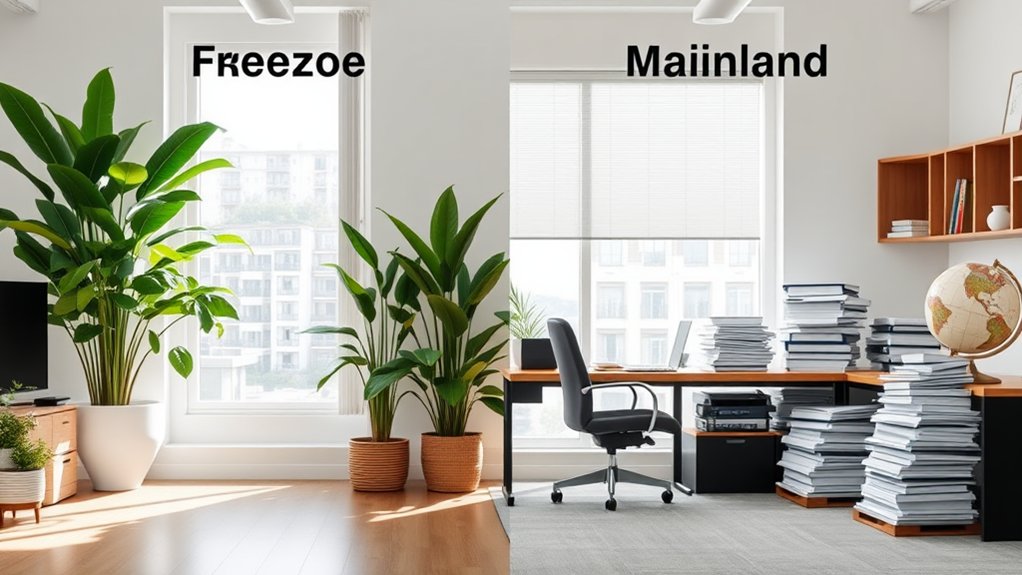Yes, freelancers and solo entrepreneurs can apply for an e-commerce license in Dubai, which enables legal online trading. This license allows for 100% ownership without the need for a local sponsor, provided you hold a valid freelance visa. The application process involves registering a unique trade name and completing necessary documentation, including a business plan and proof of residency. Additionally, an understanding of local regulations is essential to navigate compliance requirements. Acquiring this license opens up numerous opportunities in Dubai's growing e-commerce landscape. Further insights on the specifics of the application process can enhance your understanding.
Importance of E-Commerce in Dubai

E-commerce in Dubai is booming, and if you're looking to tap into this vibrant market, now's the time to act. The sector is projected to generate online sales of $9.2 billion by 2026, establishing Dubai as a significant hub for online businesses. For freelancers and solo entrepreneurs, obtaining an e-commerce license is not just beneficial; it's essential for ensuring legal operations. Maneuvering the dynamic legal landscape is imperative, as non-compliance could result in fines reaching AED 50,000. The flexibility to sell through various platforms—personal websites, recognized marketplaces, and social media—provides diverse opportunities. Understanding these regulations will empower you to operate confidently and sustainably in this lucrative market, ultimately driving your business's success in Dubai's e-commerce arena. Additionally, securing an e-commerce license allows for 100% ownership without the requirement of a local sponsor, which enhances entrepreneurial freedom.
E-Commerce License Overview
Understanding the essentials of an e-commerce license is vital for freelancers looking to establish a legitimate online presence in Dubai. You'll need to navigate the application process, which involves specific documentation and compliance with local regulations, ensuring your business activities align with the license's stipulations. By grasping these components, you can set a solid foundation for your digital enterprise and avoid potential legal pitfalls. Additionally, leveraging government collaboration can greatly enhance your understanding of the local market and regulatory landscape.
E-Commerce License Essentials
If you're a freelancer or solo entrepreneur looking to operate an online business in Dubai, obtaining an e-commerce license is vital for legal compliance. This license enables you to engage in online trading and manage inventory, focusing on digital-based operations without physical sales. To secure an e-commerce license, you'll need to select a business activity, determine your legal structure, and choose a trade name, along with obtaining approval from the Department of Economic Development (DED). The costs typically start around AED 14,500, varying by business activity and location, with processing times ranging from days to weeks. Understanding these essentials is important, as non-compliance can lead to significant fines, underscoring the significance of maneuvering Dubai's regulatory landscape effectively. Additionally, you must ensure compliance with data protection regulations, which are critical for e-commerce operations.
Application Process Overview
What steps do you need to take to secure your e-commerce license in Dubai? First, identify the specific business activities you intend to engage in, as this will determine the appropriate eCommerce licence for your needs. Next, choose a legal structure for your business and register a unique trade name with the Department of Economic Development (DED) to guarantee it reflects your brand identity. You'll need to gather required documentation, which may include trade name approval and possibly a No Objection Certificate (NOC) from the Telecommunications and Digital Government Regulatory Authority. Additionally, understanding local regulations and licensing requirements is crucial for a smooth application process. Finally, be prepared for varying costs, typically starting at AED 14,500, and allow for a processing time that can range from several days to weeks.
Compliance and Regulations
Steering through the compliance and regulations surrounding your e-commerce license in Dubai is essential for successful online trading. To operate legally, you must secure trade name approval from the Department of Economic Development (DED) and potentially obtain a No Objection Certificate (NOC) from the Telecommunications and Digital Government Regulatory Authority. This e-commerce license permits online trading and inventory storage, explicitly prohibiting physical sales, therefore ensuring compliance with local regulations. Understanding these regulations is vital, as non-compliance could result in penalties up to AED 50,000. The application process is generally swift, taking days to weeks depending on your business activities and location, but diligence in adhering to these compliance requirements is critical for mitigating legal risks and fostering sustainable growth.
Eligibility for Freelancers and Entrepreneurs

To successfully obtain an e-commerce license in Dubai, you must first secure a freelance visa, which legitimizes your operations within the UAE. Additionally, exploring various business license options and adhering to legal compliance requirements are essential steps in this process. By understanding these critical components, you can effectively position yourself as a capable freelancer or entrepreneur in the thriving e-commerce landscape.
Freelance Visa Requirements
Maneuvering the requirements for a freelance visa can feel intimidating, but understanding the eligibility criteria is essential for freelancers aiming to thrive in Dubai's vibrant e-commerce landscape. To qualify for a freelance visa, you'll need to meet specific documentation and residency requirements, including:
- Passport copies and bank reference letters
- Proof of freelance work or contracts
- Capability to sponsor family members for UAE residency
The freelance visa is valid for up to three years and can be renewed, ensuring your residency status while you operate your freelance business. Comprehending these obligations enables you to maintain compliance and avoid penalties, thereby facilitating a smoother journey as you establish your e-commerce license in the UAE.
Business License Options
When considering your options for obtaining a business license in the UAE, it's important to understand the specific eligibility criteria for freelancers and solo entrepreneurs. Freelancers can apply for an eTrader license, enabling them to conduct online trading through social media, particularly tailored for UAE and GCC nationals. Conversely, solo entrepreneurs may pursue an eCommerce License in Dubai, allowing for online sales and inventory storage, although physical sales require a separate trade license. Verify your chosen business activity aligns with the regulations set by the Department of Economic Development (DED). Additionally, you'll need to provide necessary documentation, including trade name approval and, if applicable, a No Objection Certificate (NOC) from the Telecommunications and Digital Government Regulatory Authority.
Legal Compliance Necessities
Understanding the legal compliance necessities is essential for freelancers and entrepreneurs looking to secure an e-commerce license in Dubai. To guarantee your application meets the eligibility criteria set by the Department of Economic Development, consider the following:
- Obtain a valid freelance visa to operate independently.
- Align your business activities with the approved e-commerce activities listed in your application.
- Adhere to Federal Decree – Law No. 14 of 2023, which mandates a secure technology infrastructure and consumer rights protections.
Non-compliance can lead to significant penalties, reaching up to AED 50,000. Familiarizing yourself with these legal compliance aspects will not only safeguard your e-commerce venture but also enhance your credibility in the competitive online marketplace.
Steps to Obtain an E-Commerce License
How can you smoothly navigate the process of obtaining an e-commerce license in Dubai? Start by selecting a specific business activity and legal structure that aligns with the Department of Economic Development (DED) regulations. The application process begins with securing trade name approval from the DED, ensuring your brand identity is unique and compliant. If your business involves telecommunications, you may also need a No Objection Certificate (NOC) from the Telecommunications and Digital Government Regulatory Authority. Throughout this journey, it is crucial to prepare for the required documentation, which includes proof of residency and valid identification. Keep in mind that the cost of your e-commerce license will vary, typically ranging from AED 14,500 to AED 30,000, depending on your chosen business activity and location.
Required Documentation for Application

To successfully apply for an e-commerce license in Dubai, you'll need to gather specific documentation that demonstrates your readiness to operate. This required documentation includes:
- A thorough business plan outlining your intended online operations.
- Copies of your passport and residence visa.
- Proof of a physical address, such as a lease or utility bill.
Additionally, you may need to obtain trade name approval from the Department of Economic Development (DED) and a No Objection Certificate (NOC) from the Telecommunications and Digital Government Regulatory Authority, depending on your business activities. Other documents, like bank reference letters and academic certificates, might also be necessary, contingent on the specific nature of your proposed eCommerce License in Dubai.
Business Structure Options
When considering your e-commerce venture, choosing the right business structure is essential. You can opt for a Sole Proprietorship, which grants you complete ownership, or a Limited Liability Company (LLC), which offers liability protection and the possibility of including partners. Understanding these legal structures not only guarantees compliance with local regulations but also aligns your business setup with your operational goals, paving the way for a successful e-commerce experience.
Legal Structure Choices
Choosing the right legal structure for your e-commerce business is crucial, as it affects your liability, control, and operational scope. You can opt for various legal structures, each with unique implications:
- Sole Proprietorship: Offers complete control but limits trading options in the UAE mainland if based in a Free Zone.
- Limited Liability Company (LLC): A favored choice, providing limited liability protection while permitting a broader range of activities.
- Partnership: Requires at least one Emirati partner, which may complicate foreign freelancers seeking independence.
It's essential to guarantee your chosen legal structure aligns with your intended business activities to avoid compliance issues and potential penalties. Careful consideration of these options will greatly influence your success in the e-commerce landscape.
Ownership Requirements Explained
Understanding ownership requirements is vital for freelancers looking to establish an e-commerce business in Dubai. You can apply for an eCommerce License in Dubai through various structures. A Sole Proprietorship allows you full ownership, ideal for freelancers who prefer complete control. However, if you're a foreign investor, partnering with an Emirati national might be necessary to adhere to local ownership regulations. Alternatively, forming a Limited Liability Company (LLC) can provide you with operational independence while limiting personal liability. It's essential to choose a legal structure that aligns with your intended business activities specified in the e-commerce license to avoid legal complications. Thoroughly understanding these implications guarantees your compliance with UAE laws and regulations regarding e-commerce operations.
Free Zone vs. Mainland Considerations

Deciding between a Free Zone and mainland e-commerce license can greatly impact your business operations as a freelancer.
Consider these key factors before making your decision:
- Ownership: Free Zones allow 100% ownership, while mainland licenses require local partnership for broader access.
- Market Access: Mainland licenses provide opportunities to trade across the UAE, expanding your customer base considerably.
- Application Process: Free Zones often offer quicker registration, making it easier for freelancers to get started.
Ultimately, your choice will influence your operational flexibility and market reach. While a Free Zone setup offers ownership benefits, a mainland e-commerce license opens up greater trading potential. Evaluate your business goals carefully to determine the best fit for your entrepreneurial journey.
Costs Involved in Licensing
When considering the costs involved in obtaining an e-commerce license, it's important to understand the licensing fee breakdown and any additional associated costs. For instance, while the initial application for an e-trader license may seem manageable at AED 1,070, various factors such as location and required No Objection Certificates can greatly influence your total expenditure. Additionally, be mindful of ongoing renewal fees that will arise annually, as these are vital to maintaining your business's legal standing.
Licensing Fee Breakdown
Steering through the costs of obtaining an e-commerce license can seem intimidating, but breaking it down helps clarify what to expect. The licensing fee breakdown for online trading includes several key components:
- The eTrader licence for freelancers starts at AED 1,070, making it an accessible option for quick startups.
- A standard e-commerce license typically begins at AED 14,500, varying by business activities and location.
- Additional costs may arise from trade name registration, local sponsor fees, and necessary permits.
Understanding these fees is essential for budgeting and planning your venture. By familiarizing yourself with these figures, you can navigate the complexities of obtaining a trade licence with confidence, ensuring a smoother process for establishing your online business.
Additional Associated Costs
Managing the additional associated costs of obtaining an e-commerce license is vital for freelancers aiming to establish their online presence. The initial cost for an e-commerce license in Dubai starts around AED 14,500, but freelancers must also factor in expenses for necessary documentation, such as trade name approval and potential No Objection Certificates (NOCs). If you're operating as an intermediary, a portal license may be required, with costs ranging from AED 1,070 for an eTrader license to higher amounts for extensive licenses. Additionally, annual renewal fees can vary, so budgeting for ongoing compliance is essential. Don't forget about associated expenses like payment gateway fees, typically 2% to 3.1% of sales volume, and logistics costs for efficient order fulfillment.
Understanding the Freelance Visa

How can a freelance visa transform your e-commerce journey in Dubai? This essential document allows self-employed individuals to operate legally under an e-commerce license, providing a pathway to success. Here's what you gain with a freelance visa:
- Flexibility to work independently without a local sponsor
- Access to UAE's healthcare benefits
- Ability to sponsor family members for residency
With a typical duration of up to three years and an option for renewal, it's vital to understand the requirements. You'll need to submit documentation such as passport copies, bank letters, and proof of freelance work. Adhering to local regulations guarantees you maintain residency while thriving as a self-employed e-commerce entrepreneur in the UAE.
Family Sponsorship Under Freelance Visa
With a freelance visa in hand, you not only gain the freedom to operate your e-commerce business but also the opportunity to enhance your personal life by sponsoring family members for residency in the UAE. This family sponsorship provides stability and support, allowing you to maintain close ties while pursuing your professional goals. To initiate the process, you'll need to submit specific documentation, including proof of income that meets the minimum salary requirement.
| Requirement | Details |
|---|---|
| Minimum Salary for Spouse | AED 4,000 or AED 3,000 with company accommodation |
| Sponsorship Application Body | General Directorate of Residency and Foreigners Affairs (GDRFA) |
| Required Documents | Proof of income, residency, relationship |
| Quality of Life Enhancement | Closer family ties while freelancing |
Legal Compliance for E-Commerce

To thrive in the e-commerce landscape, it's vital to understand the legal compliance required for your online business in Dubai. As a freelancer, obtaining an e-commerce license is imperative for lawful operations. Adhering to regulations not only safeguards your business but also enhances consumer trust.
Here are three key points to keep in mind:
- Documentation: Confirm you have trade name approval and potentially a No Objection Certificate (NOC).
- Regulatory Framework: Familiarize yourself with Federal Decree – Law No. 14 of 2023, which establishes specific obligations.
- Penalties: Non-compliance can lead to fines up to AED 50,000, highlighting the significance of understanding and implementing these legal requirements.
Common Challenges Faced by Freelancers
Maneuvering the e-commerce landscape can be intimidating for freelancers, especially when it comes to obtaining the necessary licenses. One major hurdle is the requirement for a local sponsor when setting up in the UAE mainland, complicating your business operations considerably. Furthermore, the strict legal compliance mandates can impose hefty fines, potentially reaching AED 50,000 for non-compliance. You'll also need to navigate the labyrinth of documentation, including trade name approval from the Department of Economic Development (DED) and possibly a No Objection Certificate (NOC), which can be time-consuming. Additionally, the initial investment for an e-commerce license can weigh heavily on your budget, with costs fluctuating based on your specific business activities and required documentation.
Benefits of an E-Commerce License

While traversing the e-commerce landscape can be challenging, obtaining an e-commerce license offers numerous benefits that can greatly enhance your freelance business. This license not only allows you to operate legally but also opens doors to diverse income streams. Consider these advantages:
- Legal Compliance: Avoid hefty penalties of up to AED 50,000 by adhering to local regulations.
- Enhanced Credibility: Gain customer trust, as a license signifies compliance with consumer protection laws.
- Operational Flexibility: Store inventory and trade online without the need for a physical storefront.
Market Opportunities for Freelancers
As the e-commerce landscape continues to evolve, freelancers are presented with an array of market opportunities that can greatly boost their businesses. The UAE e-commerce market is projected to reach $9.2 billion by 2026, a significant opening for you to engage with an expanding consumer base. With online sales having surged by 22% from 2015 to 2022, there's ample room for you to offer specialized products or services. Moreover, the anticipated rise of mobile commerce, expected to account for 54% of total sales globally, empowers freelancers to connect with customers through mobile-friendly platforms. Additionally, the increasing demand for personalized shopping experiences—where 80% of consumers favor tailored offerings—presents a lucrative niche for you to explore, enhancing customer satisfaction and loyalty.
Trends in E-Commerce in Dubai

Given the rapid advancements in technology and changing consumer behaviors, trends in e-commerce in Dubai are reshaping the business landscape. As you consider obtaining an eCommerce License in Dubai, it's vital to understand the following emerging trends:
- Mobile Commerce Dominance: With mobile sales accounting for 54% of total eCommerce, optimizing for mobile is critical.
- Personalization: 80% of consumers prefer brands offering tailored shopping experiences, emphasizing targeted marketing strategies.
- Rise of Social Commerce: Expected to reach $1.2 trillion by 2025, social media is becoming a key platform for online sales.
These trends highlight significant growth potential, making it an opportune time for freelancers and solo entrepreneurs to capitalize on the evolving e-commerce landscape in Dubai.
Resources for Further Assistance
The evolving e-commerce landscape in Dubai presents exciting opportunities for freelancers, but maneuvering through the licensing process can seem intimidating. To navigate this, start by consulting the Department of Economic Development (DED) for specific guidelines on obtaining an eCommerce License in Dubai. Consider leveraging resources like company formation specialists who can simplify the application process and guarantee compliance with local regulations. Additionally, the eTrader license offers an accessible option for UAE and GCC nationals, enabling business through social media with minimal bureaucracy. Gather the necessary documentation, including trade name approval and any required No Objection Certificates. By utilizing these resources, you can proficiently establish your e-commerce venture and confidently commence your entrepreneurial journey.
Frequently Asked Questions
Do I Need a License to Freelance in the UAE?
Yes, you need a license to freelance in the UAE. Familiarize yourself with freelancer regulations, UAE business laws, and online trade permits to guarantee compliance. Also, stay updated on freelance taxation rules to avoid issues.
Who Can Get an E-Trader License in Dubai?
Imagine planting a seed; with the right conditions, it'll grow. To get an e-Trader license in Dubai, you must meet e-trader eligibility criteria, fulfilling freelance license requirements while reaping benefits of e-commerce regulations.
How to Start an E-Commerce Business in the UAE?
To start an e-commerce business in the UAE, conduct market research, choose e-commerce platforms, set up payment gateways, and focus on product sourcing. These steps will help you build a successful online presence.
Can I Sell Online Without a Business License in the UAE?
Selling online in the UAE without a business license is like sailing without a map—you'll hit rough waters. You must follow online selling regulations and business license requirements for e-commerce compliance, especially under UAE freelance rules.
Conclusion
In summary, obtaining an e-commerce license as a freelancer or solo entrepreneur in Dubai not only legitimizes your business but also opens up a treasure trove of market opportunities. By adhering to the outlined steps and fulfilling the necessary documentation requirements, you position yourself at the forefront of a rapidly evolving digital landscape. Embrace the burgeoning trends in e-commerce, and leverage this license to weave your entrepreneurial vision into the vibrant tapestry of Dubai's thriving marketplace.













